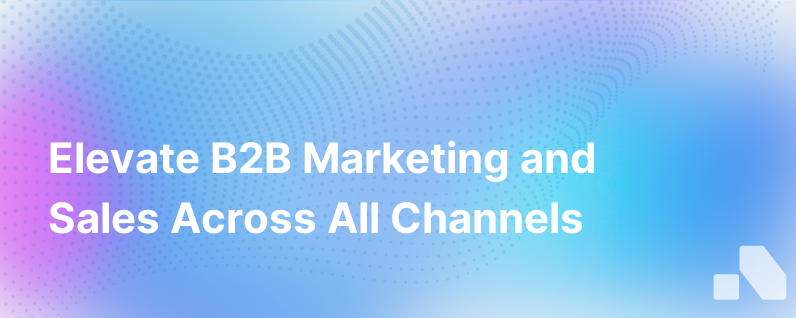
Maximizing Marketing and Sales Synergy Across All Channels
In the rapidly evolving business-to-business (B2B) landscape, organizations strive to carve out a competitive edge through innovative strategies that boost both marketing and sales performance. With the increasing diversity of channels through which B2B companies can reach potential clients, creating a harmonized and powerful approach across every platform is not just beneficial but essential. This article dives into various strategic imperatives that can amplify your B2B marketing and sales outcomes, ensuring every touchpoint is optimized for engagement, lead generation, and conversion.
Integrated Multi-Channel Strategy
Synchronizing marketing and sales efforts across various channels begins with a cohesive multi-channel strategy. Integration ensures that messaging is consistent, branding is recognizable, and efforts across disparate channels are synergized to maximize impact. Organizations must:
-
Identify the Right Channels: Understand the unique value and audience of each platform. Linkedin may be ideal for thought leadership, while industry forums might attract niche audiences passionate about specific topics.
-
Customize Approach Per Channel: Tailor content and engagement strategies to fit the nature of the channel. Comprehensive whitepapers work well for email campaigns, while bite-sized, impact-driven posts excel on social media platforms.
-
Use Cross-Channel Analytics: Employ analytics to understand the customer journey across channels, measure performance, and identify the most effective strategies for each platform.
Data-Driven Decision Making
Progressive B2B companies wield the power of data analytics to make informed decisions that enhance both marketing and sales performance:
-
Leverage Predictive Analytics: Utilize advanced analytics to predict future customer behaviors based on historical data, refining marketing, and sales approaches accordingly.
-
Customer Segmentation: Divide your market into segments based on demographic, psychographic, and behavioral data to create more targeted and effective sales pitches and marketing campaigns.
-
Sales and Marketing Alignment: Ensure that sales and marketing teams are using the same datasets and KPIs to evaluate their strategies and collaborate on improving tactics across all channels.
Content That Converts
The fuel for effective B2B marketing and sales channels is high-quality, authoritative content:
-
Thought Leadership: Establish your brand as an industry authority through insightful blogs, studies, whitepapers, and webinars.
-
SEO-Optimized Content: Maintain a robust online presence with SEO-focused content that ensures high visibility in search engine results.
-
Personalized Content: Leverage data insights to tailor content to meet the specific needs and interests of leads at different stages of the sales funnel.
Empowering Sales Enablement
Sales enablement tools and content are imperative for sales teams to convert leads effectively:
-
Provide Comprehensive Resources: Equip sales teams with detailed case studies, product information, FAQs, and battlecards that enable them to engage prospects with confidence.
-
Invest in Training: Continuous training programs keep sales teams updated on best practices for each channel and how to use enablement tools effectively.
-
Technology Utilization: Encourage the adoption of CRM systems, sales intelligence platforms, and other technologies that streamline sales processes and customer interactions.
Harnessing Automation and AI
The intersection of automation and artificial intelligence (AI) with B2B sales and marketing can vastly enhance efficiency and effectiveness:
-
Marketing Automation: Deploy campaigns that automatically send out targeted content based on user triggers and behaviors.
-
AI-Driven Insights: Use AI for deep learning about buyer interests and behaviors, personalizing interactions and anticipatory selling.
-
Chatbots and Virtual Assistants: Integrate AI-powered chatbots to guide leads through the sales funnel by answering questions, setting up meetings, or providing personalized recommendations.
Social Selling and Influencer Partnerships
Social media is an invaluable tool for B2B marketers and sales professionals:
-
Utilize Social Selling: Train sales teams to build relationships and engage with potential buyers through social networks.
-
Collaborate with Influencers: Form partnerships with industry influencers to tap into their audience base and build brand credibility.
-
Encourage Employee Advocacy: Motivate your workforce to become brand ambassadors on their personal social media profiles, extending your brand's reach authentically.
Continual Optimization and Agility
In a world where market dynamics can shift rapidly, B2B companies must remain agile and continuously refine their strategies:
-
Conduct A/B Testing: Test different versions of your content, messaging, and sales approaches to determine what resonates best with your audience.
-
Feedback Loops: Implement feedback mechanisms to learn from both successes and failures, making ongoing adjustments to strategies and tactics.
-
Market Adaptability: Stay informed about industry trends and be ready to pivot strategies in response to market changes or competitive actions.
To achieve a zenith in B2B marketing and sales effectiveness, it is crucial to embrace a multi-faceted, integrated approach. With an in-depth understanding of each channel, a commitment to data-driven strategies, outstanding content, and the strategic use of technology and social selling, companies can not only meet the diverse needs of their B2B clientele but exceed them, turning every interaction into an opportunity for growth. And while honing these strategies takes effort, platforms like Aomni can streamline the process, synthesizing market insights and aligning sales content to help organizations sell more strategically and efficiently. By capitalizing on such advancements, B2B sales initiatives become not just individually successful but operate in a powerful, cohesive symphony.